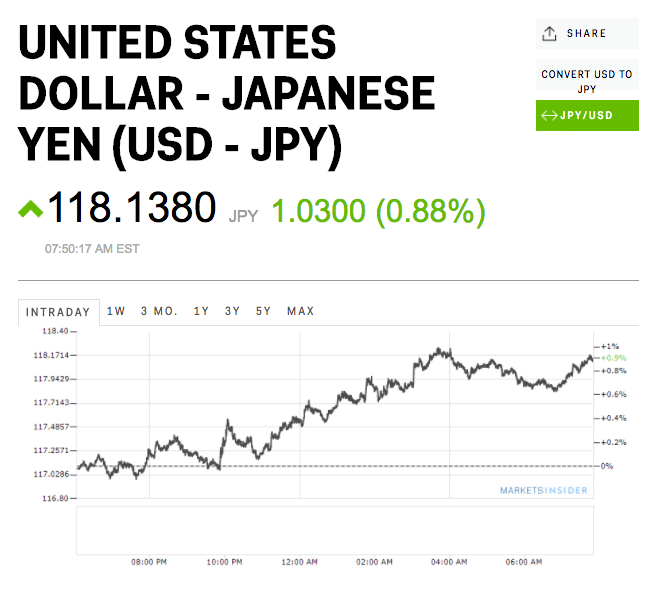The Japanese yen is tumbling after the Bank of Japan kept policy on hold, as virtually all analysts were expecting.
The currency is down by 0.9% at 118.14 per dollar as of 7:51 a.m. ET.
The yen has weakened by about 11% against the dollar since the election of Donald Trump in early November.
At its Tuesday meeting, the BOJ said it would continue to purchase Japanese government bonds at an annual pace of about 80 trillion yen to maintain a 10-year JGB yield of about 0%.
Interest rates were also left unchanged at -0.1%.
But while it made no change to policy settings, it did upgrade its assessment of the economy, noting that a "moderate recovery trend had continued" while exports "picked up".
"...the bigger picture is that economic conditions have started to improve recently," Capital Economics' Marcel Thieliant wrote. "What's more, the exchange rate has weakened sharply since the US presidential election. Corporate profits already started to rebound in spring, and a weaker yen will provide an additional tailwind by lifting the value of exports and earnings of overseas subsidiaries."
"A weaker yen will also lift prices of imports, and could boost inflation by 0.5 percentage points next year," he added. "We expect both headline and underlying inflation to rebound sharply in coming months. As such, we expect the Bank to leave policy settings unchanged for the foreseeable future."
As for the rest of the world, here's the scoreboard as of 7:53 a.m. ET:
- The euro is down by 0.4% at 1.0360, a 14-year low against the dollar. Separately, German PPI rose 0.3% month-over-month in November, above expectations of a 0.1% uptick. The British pound is down by 0.5% at 1.2336 against the dollar. "Sterling, which traded like a ton of bricks yesterday, is not faring much better today," wrote Marc Chandler, global head of currency strategy at Brown Brothers Harriman. The Turkish lira is up by 0.2% at 3.5269 per dollar after Turkey's central bank unexpectedly kept all of its official rates unchanged. This follows Monday, when the lira fell against the dollar by 0.8% after Russia's ambassador to Turkey was shot dead in Ankara, the Turkish capital. "The accompanying statement didn't give much away, although it did suggest that economic weakness - GDP contracted by 1.8% y/y in Q3 - meant another rate hike wasn't warranted today," wrote William Jackson, senior emerging markets economist at Capital Economics. "The recent stabilization of the lira against the dollar, and comments from President Erdogan arguing against higher interest rates, probably played a role too." The Russian ruble is up by 0.4% at 61.6866 per dollar, while Brent crude oil, the international benchmark, is up by 1.2% at $55.59 per barrel. The US dollar index is up by 0.5% at 103.61.

